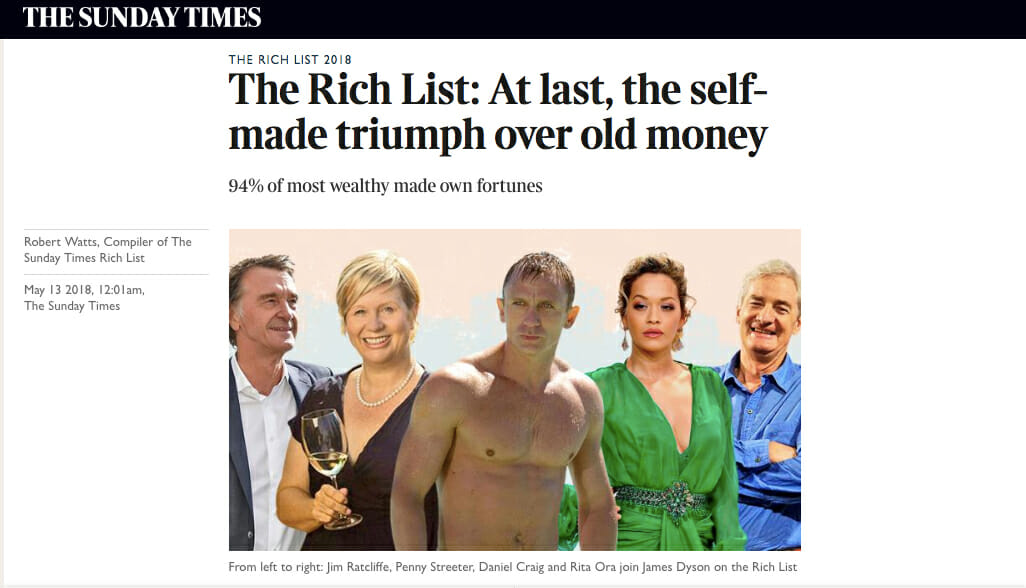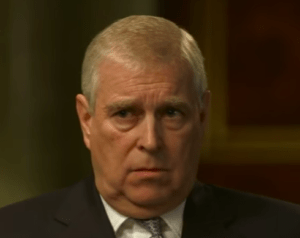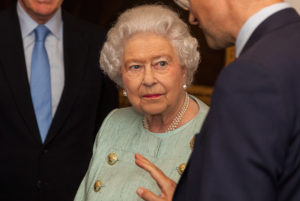In the U.K., Old Money Makes Way for Wealthy Refugees
The 2018 Sunday Times Rich List shows that the elite class in England now features almost all self-made entrepreneurs—and many are immigrants. Screen shot / The Sunday Times
Screen shot / The Sunday Times
A survey conducted in the United Kingdom found that residents are seven times more willing to admit they’ve contracted a sexually transmitted disease than answer questions about their salary or reveal their household income.
That the subject of money is taboo for the British does nothing to diminish their interest in who among them has it. This might explain the popularity of The Sunday Times Rich List. Updated annually in April and published as a supplement by the newspaper, the list ranks the 1,000 wealthiest people or families in the United Kingdom. A candidate’s net worth is estimated from a range of public information based on values at the beginning of each calendar year.
The editors make a point of specifying that the list “includes individuals and families born overseas but who predominantly work and/or live in Britain.” Statistically and culturally revealing this year is the increased number of people generating the nation’s private wealth who are not British-born citizens. To put it bluntly, the crown and fortuned aristocrats have given way to the nation’s earners. 2015 was the first year that Queen Elizabeth failed to make the list’s 300 most wealthy—when the list began in 1989, she was ranked No. 1. The 2018 list illustrates how money is being made more frequently than it is being inherited. It also shows the growing number of places claimed by former refugees.
In a time of polarizing debates on immigration, this year’s Sunday Times Rich List includes a Bangladesh-born seafood tycoon, who, as a boy, witnessed the massacre of Hindus during his nation’s independence war; a billionaire financier who survived two incarcerations in Iraqi prisons, where he was beaten and tortured; and a property entrepreneur who fled Cyprus with his family after the 1974 Turkish invasion. Ranked as well is someone who arrived in Britain with $27 to support himself, his wife and two daughters. His current wealth is listed as just over $271 million, and he has given some $54 million to worthy causes, including the National Health Service.
Another rags-to-riches story—albeit not rich enough to make its way onto the list—is that of 48-year-old Sajid Javid, a British Conservative Party politician who, formerly and at the age of 25, was named a vice president of Chase Manhattan Bank in New York City before he became a managing director of Deutsche Bank. Javid recently was appointed home secretary. He is the first Asian and the first from a Muslim background to hold that position, which is recognized as one of the most crucial roles in the British Cabinet.
Javid’s father arrived in Britain from Pakistan with no money, and “no money” is meant in the literal sense. After working as a bus driver, he moved his family to Bristol and opened a clothes store on what was then described as the most crime-ridden street in the country. The Javids lived in a two-bedroom flat above the store. “Three brothers were in one bedroom, and myself and a younger brother were with my parents in the other” is Javid’s description. His area of expertise as home secretary includes the issue of immigration.
Meanwhile, on the United States side of the Atlantic, the number of refugees allowed to enter America has been capped by the Trump administration at the lowest since Congress created the program in 1980. That being the case, it would behoove American politicians who have taken a stand against people fleeing persecution in their home countries to consider the refugees who have added to this year’s economy in Britain, a nation that took them in.
Your support matters…Independent journalism is under threat and overshadowed by heavily funded mainstream media.
You can help level the playing field. Become a member.
Your tax-deductible contribution keeps us digging beneath the headlines to give you thought-provoking, investigative reporting and analysis that unearths what's really happening- without compromise.
Give today to support our courageous, independent journalists.








You need to be a supporter to comment.
There are currently no responses to this article.
Be the first to respond.